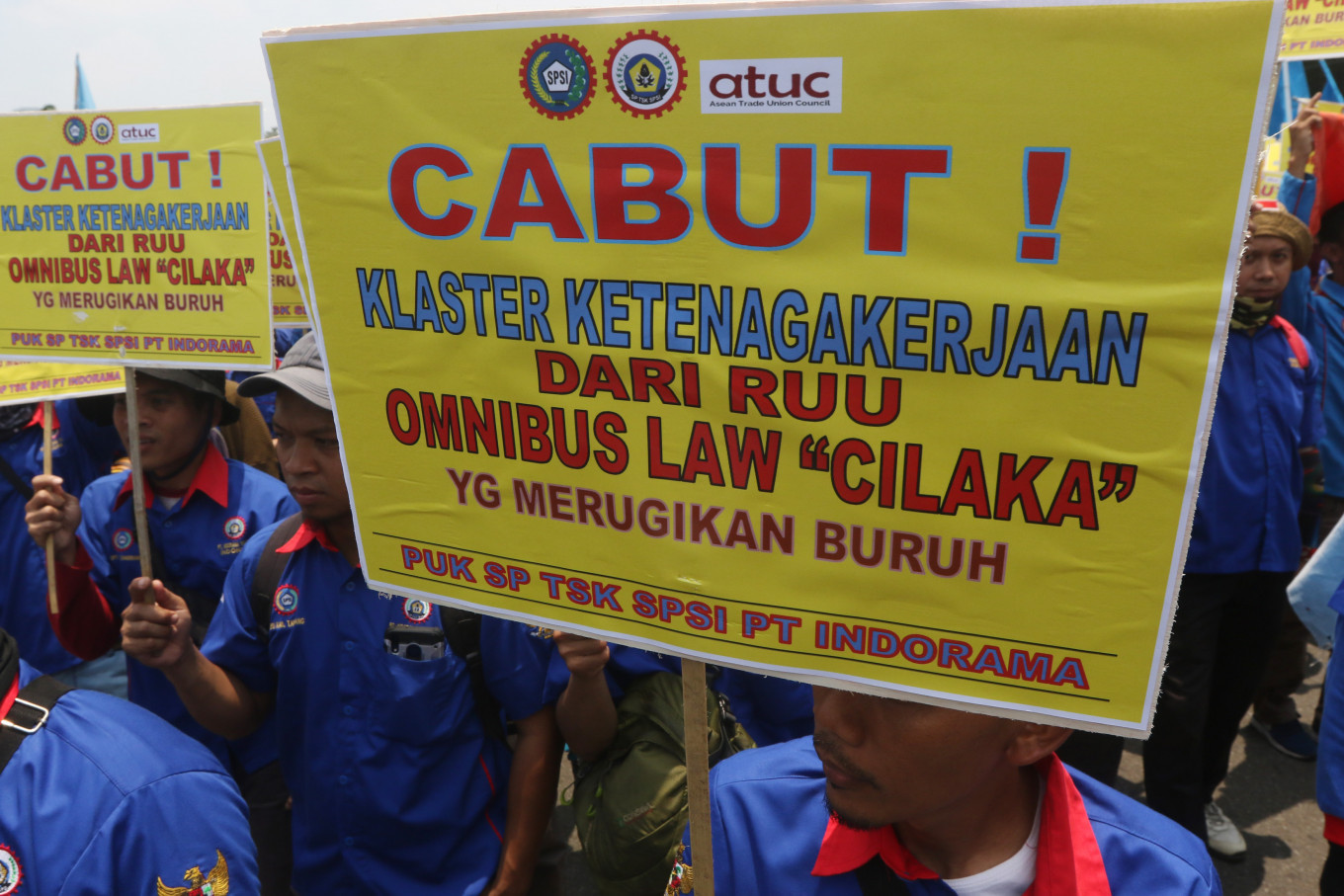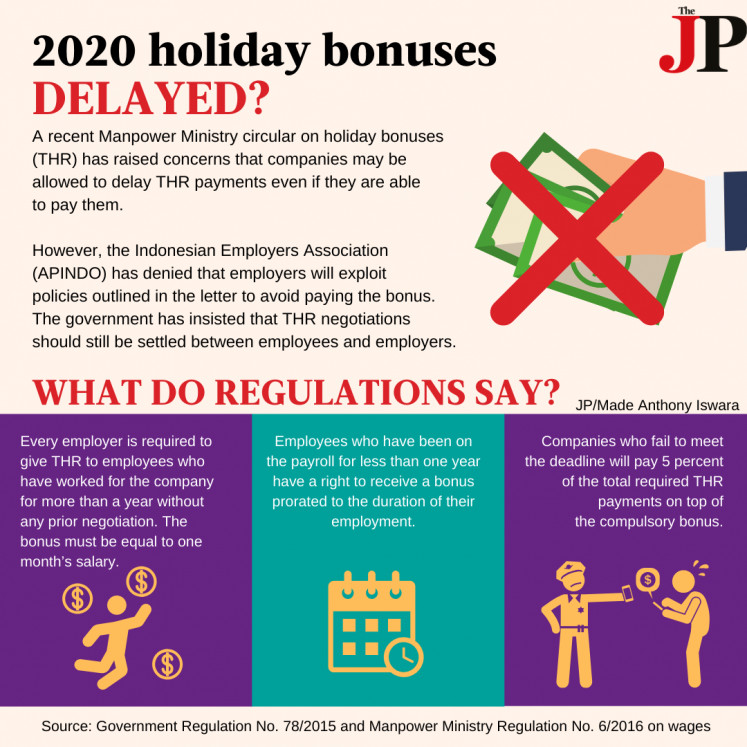Popular Reads
Top Results
Can't find what you're looking for?
View all search resultsPopular Reads
Top Results
Can't find what you're looking for?
View all search resultsLabor groups demand financial transparency after government allows holiday bonus delay
A new Manpower Ministry policy may encourage "stowaways": businesses that are fully capable of paying holiday bonuses (THR) but choose not to.
Change text size
Gift Premium Articles
to Anyone
A
recent Manpower Ministry circular on holiday bonuses (THR) may violate workers’ rights as it gives grounds for businesses to defer bonus payments, critics have said.
Airlangga University labor expert Hadi Subhan said the new policy, which was designed to assist companies struggling financially as a result of the COVID-19 outbreak, might instead encourage "stowaways": businesses that were fully capable of paying the THR but chose not to.
“Employers already have strong [bargaining power in negotiations] without the circular. With the circular, workers will now be increasingly oppressed,” he said on Thursday, calling on businesses to be transparent about their financial situations.
The ministerial circular issued on May 6 stipulated that companies could pay the THR in installments or delay the bonuses for an agreed period of time if they were unable to pay them. The company would need to be transparent about its financial condition and hold employer-employee dialogues to reach an agreement, which would then be reported to local manpower agencies, the circular said.
However, Hadi said the circular contradicted a 2015 Government Regulation on wages and a 2016 Manpower Ministry Regulation on holiday bonuses, neither of which made any allowances for delays or non-payments of the THR.
The regulations instead require businesses to pay bonuses equal to one month of each worker’s salary seven days before certain religious holidays – Idul Fitri in this case. Failure to meet the deadline, according to the previous regulations, will result in a penalty of 5 percent of the total THR payment on top of the compulsory bonus.
2020 holiday bonuses delayed? (JP/Made Anthony Iswara)Confederation of Indonesian Trade Unions (KSPI) president Said Iqbal objected to the new policy, saying that the option to defer should only be given to small and medium enterprises.
He said the two prevailing regulations required all employers to pay holiday bonuses to employees who had worked at the company for more than one year without any prior negotiation. Employees who had been on the payroll for less than one year had a right to receive bonuses prorated to the length of their employment.
The group has brought the circular to the Jakarta State Administrative Court (PTUN) and will set up help desks in 30 provinces where workers will be able to report unfair compensation by their employers. The group has also urged workers and employers to disregard the circular, except in cases where companies can demonstrate losses over the past and current year.
“We must reject the ministry’s circular. Employers must provide 100 percent of their employees’ holiday bonuses. Providing less than full holiday compensation or releasing the funds in installments is simply out of the question,” Said Iqbal said in a statement on Thursday.
Read also: Businesses must have adequate support to prevent layoffs: Experts
Indonesian Employers Association (APINDO) deputy chairman for labor affairs Bob Azam denied that employers would exploit the policies outlined in the circular to avoid paying bonuses. Bob said the late fees would deter companies from delaying THR payments. He said the majority of companies would pay the bonus and only a small number would misuse the policy.
He welcomed the ministry’s new regulation despite the fact that it was slightly different from what his organization had proposed in April. APINDO suggested that the THR should be deferred until December.
The contradictions between the circular and prevailing regulations, he said, were because the previous policies were not made for “emergency situations”, and thus new guidelines were needed. He said the deferral would allow companies to pay expenses, such as wages, electricity and taxes, to stay in operation during the pandemic.
“The conditions in each company are different, so it is more optimal to leave the matter in an employee-employer settlement. Do not let other parties act as if they know the company better than the ones inside it,” he said.
Although she did not directly mention the circular, Manpower Minister Ida Fauziah told the media on Friday that THR negotiations should still be settled between employers and workers in line with new policies.
“[The key is] to look for a collective solution between employers and workers to overcome this THR payment,” Ida said. “[...] Employers must transparently disclose their financial performance.”
Read also: Concerns arise as government undermines rule of law in pandemic response
Last month, the Industry Ministry discussed the possibility of providing soft loans to enable businesses to pay Idul Fitri holiday bonuses because companies were withholding or cutting bonuses, citing the COVID-19 downturn.
Industry Minister Agus Gumiwang Kartasasmita told kompas.com on Thursday that the soft loan proposal seemed impossible to achieve. He declined to give further details.











